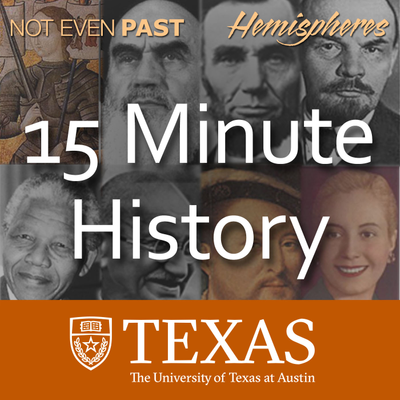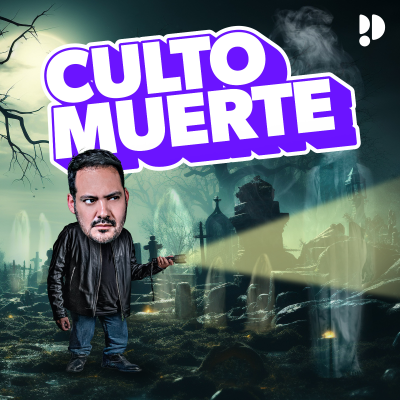
15 Minute History
English
History & religion
Start 30 days free trial
99 kr. / month after trial.Cancel anytime.
- 20 hours of audiobooks / month
- Podcasts only on Podimo
- All free podcasts
About 15 Minute History
15 Minute History is a history podcast designed for historians, enthusiasts, and newbies alike. This is a joint project of Hemispheres, the international outreach consortium at the University of Texas at Austin, and Not Even Past, a website with articles on a wide variety of historical issues, produced by the History Department at the University of Texas at Austin. This podcast series is devoted to short, accessible discussions of important topics in world history, United States history, and Texas history with the award winning faculty and graduate students at the University of Texas at Austin, and distinguished visitors to our campus. They are meant to be a resource for both teachers and students, and can be enjoyed by anyone with an interest in history. For more information and to hear our complete back catalog of episodes, visit our website!
All episodes
41 episodesEpisode 123: Scientific, Geographic & Historiographic Inventions of Colombia
The historian Andre Gunder Frank has theorized that former colonies cannot develop economically until they have overcome the legacy of their colonial past. The ways that the United States has overcome the legacy of its colonial past with Great Britain is, in many ways, unique, especially by comparison to the former Spanish Americas. Today’s guest, Lina del Castillo, recently published a book titled Crafting Republic for the World: Scientific, Geographic, and Historiographic Inventions of Colombia, which offers a new understanding of how Gran Colombia–which split from Spain at the beginning of the 19th century, and then further subdivided into Panama, Colombia, Venezuela, and Ecuador–came to deal with its own past, and the role that science, geography, and history came to play alongside politics as the former colonies grew into nationhood.
Episode 122: The History of Sexual Orientation Conversion Therapy in the U.S.
Sexual orientation conversion therapy, the attempt to change one’s sexual orientation through psychological or therapeutic practice, has now been banned in 17 American states and the District of Columbia and Puerto Rico, three Canadian provinces, one state in Australia and several nations in Latin America, Europe, and Asia. Beyond the merits of sexual orientation conversion therapy as a medical practice, however, lies a social importance of what the practice represents for a segment of American society. Today’s guest, Chris Babits, is a postdoctoral fellow at the University of Texas at Austin, where he researches the history of the practice and why so many people still support it, even in the face of opposition from medical and psychological professionals.
Episode 121: The Case for Women’s History
In the spring of 2019, a widely circulated column assailed the field of history for being too “esoteric,” in particular calling out subfields like women’s and gender studies. The executive director of the American Historical Association, Jim Grossman, wrote a response suggesting that the critic should have talked to actual historians about why fields that may seem esoteric are actually very valuable. Today’s guests are the editors of the Oxford Handbook of American Women’s and Gender History. Ellen Hartigan O’Connor and Lisa Matterson, both professors of history at the University of California, Davis, join us to discuss the field of women’s studies, which as they’ve argued in the introduction to the book, is not an esoteric topic at all, but actually quite critical to our understanding of American history.
Episode 118: The Caribbean Roots of Biodiversity Science
Biodiversity has been a key concept in international conservation since the 1980s, yet historians have paid little attention to its origins. Uncovering its roots in tropical fieldwork and the southward expansion of U.S. empire at the turn of the twentieth century, Megan Raby details how ecologists took advantage of growing U.S. landholdings in the circum-Caribbean by establishing permanent field stations for long-term, basic tropical research. From these outposts of U.S. science, a growing community of American “tropical biologists” developed both the key scientific concepts and the values embedded in the modern discourse of biodiversity.
Episode 117: Albert Einstein – Separating Man from Myth
The subject of endless speculation, fascination, and laudatory writings, German physicist Albert Einstein captured the imaginations of millions after his discoveries transformed the field of physics. Hailed as a god, saint, a miracle, and even a canonized angel by his biographers and contemporaries alike, Einstein seems a figure worthy of his larger than life status. Not so fast says today’s guest, Dr. Alberto Martínez. We go deep into the personal life of Einstein, discussing his damaged relationships, intellectually incoherent views on pacifism and religion, and his own eccentric worldview. Guest Dr. Martínez of the University of Texas at Austin joins us today to discuss who Einstein really was, and how science really is done – reminding us that Einstein was not Jesus Christ, not Harry Potter, but just a normal man.
Choose your subscription
Premium
20 hours of audiobooks
Podcasts only on Podimo
All free podcasts
Cancel anytime
Start 30 days free trial
Then 99 kr. / month
Premium Plus
Unlimited audiobooks
Podcasts only on Podimo
All free podcasts
Cancel anytime
Start 30 days free trial
Then 129 kr. / month
Start 30 days free trial. 99 kr. / month after trial. Cancel anytime.





































